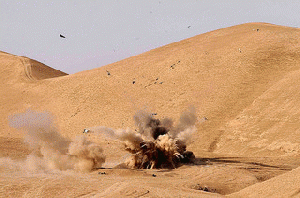The Islamic State appears to have manufactured rudimentary chemical warfare shells and attacked Kurdish positions in Iraq and Syria with them as many as three times in recent weeks, according to field investigators, Kurdish officials and a Western ordnance disposal technician who examined the incidents and recovered one of the shells.In the clearest recent incident, a 120-millimeter chemical mortar shell struck sandbag fortifications at a Kurdish military position near Mosul Dam on June 21 or 22, the investigators said, and caused several Kurdish fighters near where it landed to become ill. The shell did not explode and was recovered nearly intact on June 29
The development, which the investigators said involved toxic industrial or agricultural chemicals repurposed as weapons, signaled a potential escalation of the group’s capabilities, though it was not entirely without precedent.
Firing chemical mortar shells across distances, however, as opposed to dispersing toxic chemicals via truck bombs or stationary devices, would be a new tactic for the group, and would require its munitions makers to overcome a significantly more difficult technical challenge.
Chemical weapons, internationally condemned and banned in most of the world, are often less lethal than conventional munitions, including when used in improvised fashion. But they are indiscriminate by nature and difficult to defend against without specialized equipment — traits that lend them potent psychological and political effects.
Read the rest of the story HERE:

At www.nytimes.com
I began teaching in 1963,; Ba and BS in Education -Brooklyn College. I have the equivalent of 2 additional Master's, mainly in Literacy Studies and Graphic Design. I was the only seventh grade teacher of English from 1990 -1999 at East Side (more...)





